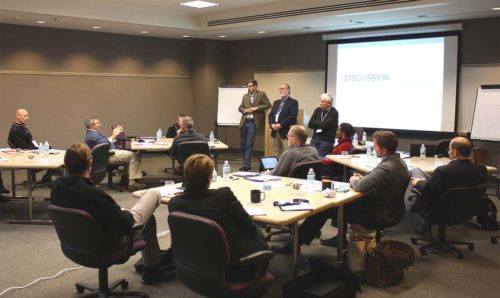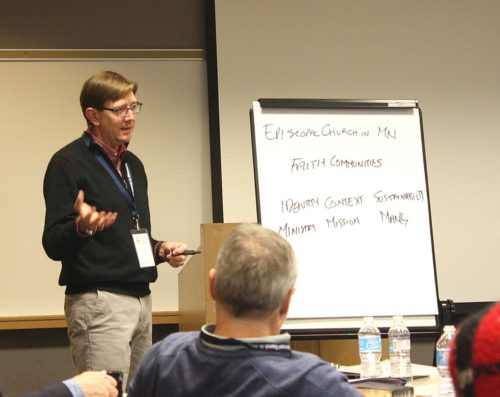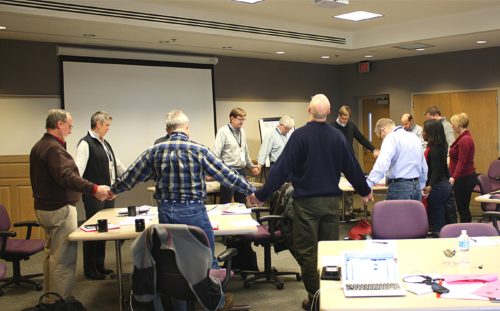Cultivating ‘missional imagination’Posted Jan 27, 2014 |
|

Consultants from the Missional Network, the Rev. Dwight Zscheile, the Rev. Craig Van Gelder, and the Rev. Alan Roxburgh facilitated the Missional Summit, Jan. 21-23 in Minneapolis, Minnesota. Photo: Joe Bjordal/ENS
[Episcopal News Service] Five Episcopal bishops, three theologians, diocesan missioners and observers gathered Jan. 21-23 in a suburban Minneapolis, Minnesota, conference center to begin a conversation about discovering a new identity for the church in a new age.
The three-day Missional Summit was designed to explore new ways of interpreting, experiencing and acting out God’s mission (‘missional imagination’) and that engaging in God’s mission—not the church’s mission—there are possibilities to change the very identity and culture of the church to better serve the world.
Kindred spirits in making change
The gathering included representatives of four Episcopal dioceses who have, according to the host, Minnesota Bishop Brian Prior, “taken a deep dive into the missional church.” In his opening remarks he described the participating bishops are “kindred spirits who have begun to make organizational and systemic changes in their dioceses,” and said the idea for the Missional Summit, which grew out of conversations with Connecticut Bishop Ian T. Douglas, was that it would be an opportunity for peer learning and sharing best practices and grounded in deep theology.

Minnesota Bishop Brian Prior explaining changes to make the Episcopal Church in Minnesota more ‘missional.’ Photo: Joe Bjordal/ENS
Colorado Bishop Robert O’Neill, and Long Island Bishop Lawrence Provenzano also participated with Prior and Douglas, as well as members of their diocesan staffs. And the Rev. Thomas Brackett, the Episcopal Church’s officer for church planting and ministry redevelopment, was invited to observe on behalf of wider church.
Also participating was Maine Bishop Stephen Lane, who is spending a month-long sabbatical in the Episcopal Church of Minnesota to study firsthand how it “is beginning to organize itself differently and to consider its life differently in relation to God’s mission.” He says he perceives the focus in the Episcopal Church in Minnesota is “less on its own internal life and more on the life of God in the world and is organizing for that. I’m trying to see how that works.”
Lane said that following the Missional Summit he planned to “tag team” with members of the diocesan staff as they travel around the state.
Challenged by the theology of Misseo Dei
The Missional Summit was facilitated by three theologians—all consultants with the Missional Network and leading voices in the missional church movement : the Rev. Alan Roxburgh, the Rev. Craig Van Gelder and the Rev. Dwight Zscheile. Their charge was to provide historical, organizational and biblical/theological resources to serve as a baseline for discussion and peer learning about missional efforts and discoveries in each participating diocese.
Roxburgh is a Canadian pastor, teacher and writer who consults with denominations, congregations and seminaries worldwide. He is a member of the writing team that authored The Missional Church: A Vision for the Sending of the Church in North America (Eerdmans, 1998).
Van Gelder and Zscheile teach congregational mission and leadership at Luther Seminary in Saint Paul, Minnesota. They are the authors of The Missional Church in Perspective: Mapping Trends and Shaping the Conversation (Baker Academic, 2011). Zsceheile is also associate priest at St. Matthew’s Episcopal Church in Saint Paul.
Brackett said one of the reasons he readily accepted the invitation was that he wanted to hear how Roxburg, Van Gelder and Zscheile “are evolving in their relationship to the possibility of missional ministries coming out of an institutional setting.”
The theologians’ opening presentation, “Cultivating a Missional Imagination,” suggested that missional transformation in the church is possible, but only with a major shift in the way it understands its identity and context: not as having its own mission in the world, but rather as an instrument of the mission of God (Missio Dei).
Zscheile described “missional” as “identity shaped by participation in the Triune God’s ongoing mission of creation, redemption, reconciliation and consummation in the world.” He quoted theologian Jürgen Moltmann (from The Church in the Power of the Spirit, Augsburg Fortress, 1991) who said “It is not the church that has a mission of salvation to fulfill in the world; it is the mission of the Son and the Spirit through the Father that includes the church, creating a church along the way.”
Douglas, who served as professor of mission and world Christianity at Episcopal Divinity School in Cambridge, Massachusetts, for 22 years before being elected bishop of Connecticut in 2009, said in the October 2013 issue of Crux, the magazine of the diocese (which was distributed at the gathering), that the change of language in describing God’s mission is “more than semantics.”
“Moving from ‘my/our mission’ or ‘the church’s mission’ to the mission of God reflects a profound theological shift, a radical change of perspective. In the mission of God, God is the focus, not us and our activities. God’s mission starts with God and what God is up to,” wrote Douglas.
Van Gelder said that understanding a missional view of the church has three implications for its identity: it is missional by nature, the world is the horizon for God’s mission, and every context is a mission location. He said the missional church learns to “read its context,” asking “what is God up to in the neighborhood?”
“God’s spirit is always out ahead of us,” said Van Gelder. “When we really begin to believe that, it invites a very different understanding about how we relate to the world around us and our identify in God tied to the context in which we live.”
The Missional Network team also presented information and facilitated discussions around topics including “Historical Perspective on Denominations and Their Congregations,” “Understanding the Difference Between Technical and Adaptive Change,” “Addressing Adaptive Challenges,” and “Cultivating Missional Life and Practices.”
“The presentations were challenging because we are trying to turn over agency to God and we are the institutional managers,” said Lane. “It’s so easy to fall back into just being church—church centric. It’s a struggle to get out of our own way. That’s a challenge we talked a lot about.”
“The theologians have done a really great job of walking with us and pushing us to places where I don’t think we would have gone on our own,” said Prior. “We would have shared our best practices, been impressed and there would have been good networking, but they have really forced us into something much deeper and that’s been very beneficial.”
Common themes, common challenges, common bonds
The Missional Summit also provided a setting to use the theological concepts as lenses through which the specific contexts and missional efforts in the participating dioceses could be examined and discussed. Each diocese presented a comprehensive case statement about its history and current efforts to change identity, culture and practice, and common themes began to emerge. All four dioceses are working to make governance less hierarchical and more collaborative; there are efforts to help congregations discover their unique identities and understand their unique contexts (Van Gelder’s question about “what is God up to in the neighborhood?”). One participant wrote on the white board “context is everything . . . and every context is challenging.”
There was also no illusion that significant challenges and needs exist, such as changing the narrative “from church to God”; redefining the role of clergy in ministry development; identifying and equipping lay leaders; teaching and cultivating a “posture of listening”; cultivating a culture of deep formation as lifelong practice; fear of failure and many more.
Through a series of honest and vulnerable conversations over the three-day gathering, the participants agreed they did not have “all the answers,” but felt a renewed confidence in the directions they have charted. They spoke of growing close together in a new sense of community that they said would be supportive and empowering as they move forward.
“This has been about bringing together people who are struggling with the same issues; struggling with how we awaken the imagination that God is calling us into without being encumbered by all the typical things that we have to deal with,” said the Rev. Tim Hodapp, canon for mission leadership in the Diocese of Connecticut.
“Having all these people at the table has been really extraordinary,” said Rolf Lowenberg-DeBoer, missioner for community engagement in the Episcopal Church in Minnesota. “So many things came to light. We came up with some key growing edges and ministry challenges that we are all facing across each of our dioceses.”
“Many of the changes we need are very big picture, adaptive changes—paradigm shifts,” said Lowenberg-DeBoer. “You can’t just say we are going to do this, this and this in a technical process and make certain results occur. What we really need to do is to change the conversation and the questions about what is at stake here—in the Gospel, for Christians and for the world—and then take the conversation out and help people connect the biblical narrative to their own stories and experience.”
“It’s a bit challenging for me in that it means I have to question some of my assumptions about the church,” said Provenzano. “For example, it will inform who we look to for leadership in the church, particularly in terms of ordained ministry. Usually we look for people who are the best and the brightest, the most energetic, the entrepreneurs, people of prayer. But maybe now we also need to look for people who are going to be adaptive leaders, people who understand the collaborative nature of doing ministry moving forward.”
Douglas said it was “confirming and very encouraging to be together both with thinkers who spend a lot of time pondering how churches can be ever more faithful to the mission of God and with colleagues, both in the episcopate and on diocesan staffs, to have a liminal space to wrestle with and open up these questions. It has been really confirming and empowering.”
The participants promised each other that the conversation will continue. They made initial plans to continue sharing ideas, efforts, successes and failures with each other via social media and began a discussion about “widening the circle” by inviting other dioceses into the conversation.
Diving deeper
In interviews with ENS on the last morning of the gathering, participants said they found the summit helpful and hopeful and expressed resolve to continue with the work at hand .
“This has completely exceeded my expectations,” said Prior. “The sharing by people about their own contexts, what they are doing and the level at which they are doing it far surpassed what I assumed or expected and that has caused us to go deeper—to take a deeper dive.”
Brackett said he observed “a greater tolerance for uncertainty, a willingness to say ‘I don’t know but let’s discern this together,’ and a renewed sense of hopefulness for what is emerging on the margins of our institutions.
“It’s encouraging that there are people in the church who are thinking about the realities of what is happening about the call to engage God’s mission in ways we are not typically thinking about within diocesan structures,” said Provenzano. “We are usually plodding along, addressing issues as they come at us and not being proactive about where the church is headed. We need to engage mission in a very different way. Personally for me the last couple of days have provided an opportunity to reflect on leadership of a diocese that is very complex and the need for me to perhaps ask more questions than have answers.”
“God is saying ‘come on out and be part of what I am doing,’” said Hodapp. “Here we’ve been able to take some real intentional time and give ourselves the permission to not have all the answers and explore what is possible. It’s been hopeful and exciting!”
— Joe Bjordal is an ENS correspondent.


Social Menu